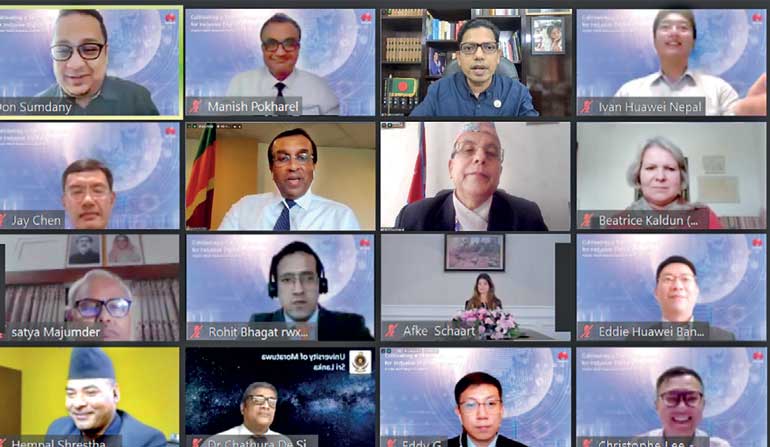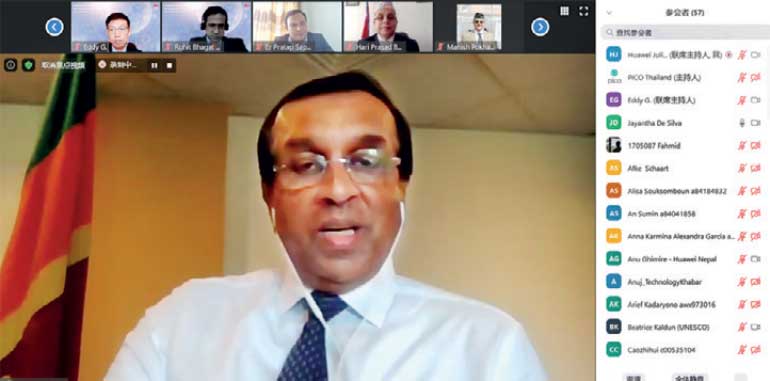Monday Feb 23, 2026
Monday Feb 23, 2026
Tuesday, 25 May 2021 00:55 - - {{hitsCtrl.values.hits}}

Digital Summit

Ministry of Technology Secretary Jayantha De Silva
Joint-handedly with the governments, universities and industrial partners, Huawei will support South Asian countries such as Bangladesh, Sri Lanka and Nepal to cultivate 100,000 digital talents over the next five years, Huawei spokesperson said on Thursday at the Digital Talent Regional Summit online.
Themed ‘Cultivating a Talent Ecosystem for Inclusive Digital Prosperity,’ the summit brought together ministers and scholars from the three countries, experts and representatives from UNESCO and the ICT industry, to explore collaborative initiatives for closing the gaps in digital skills and facilitating the digital transformation in the post-pandemic economic recovery.
“We believe the talent ecosystem is the cornerstone of the economic recovery, and a long-lasting digital future. However, the lack of digital skills is one of the biggest challenges facing many countries,” said Huawei Asia Pacific Vice President Jay Chen, at the summit. “In the next five years, Huawei expects to develop more than 100,000 ICT talent and build a vibrant digital talent ecosystem in this dynamic region, especially Bangladesh, Sri Lanka and Nepal.”The ministers and secretary appreciated the initiative of Huawei to support the Government on providing ICT solutions and training the digital talents.
“We call for all the stakeholders from public to private sectors, to put more efforts on ICT talents cultivation. We are happy to have companies such as Huawei’s initiatives such as ICT Academy to promote a greater understanding and interest in the telecommunications industry and ICT and encourage regional building and participation in digital community,” said Sri Lanka Ministry of Technology Secretary Jayantha De Silva.Huawei ICT Academy is launching this year, focusing on three domains: Public awareness, ICT Vocational Training and Joint innovation with Sri Lankan universities.
The secretary stressed that it is vital that along with ICT technology, talent and skills are essential to building a long-lasting digital future. And according to the Sri Lankan Government’s National Policy Framework, the top priority to produce ‘technocrats’ who are globally recognised with internationally acclaimed qualifications to meet the global employment markets. “Young ICT talents will be the leaders of the future world,” Ministry of Technology Secretary Jayantha De Silva said.
Scholars and experts from the region participated in the panel discussion at the event explored the recommendations for addressing the talent challenges, including translating digital vision into accessible talent development solutions, developing standards and skills frameworks for ICT roles, upgrading and channelising the overall academic infrastructure, and facilitating digital talent mobilisation.
“We firmly believe that advance knowledge will create new opportunities and ICT talent is the cornerstone and power wheel of a digital economy. University of Moratuwa is dedicated to cultivate competive ICT talents in the region. Also we are happy to see our students to be able to pactice the lastest industrial knowledge through the innovation center with Huawei, which furtherly help them to better understand industrial requirements,” Dr. De Silva from the University of Moratuwa said.
Representatives from international organisations also emphasised the importance of closing the digital skills gap for sustainable development. “More than ever before, digital talent and innovative ICT solutions are needed to respond to the challenges caused by the pandemic. I highly value and recognise the contribution from private sectors such as Huawei, through UNESCO Global Education Coalition and other programs, to the sustainable development in the region,” said Beatrice Kaldun, Head of Office and UNESCO Representative to Bangladesh.
During the pandemic, Huawei has cooperated with partners including the UNESCO to provide digital solutions and distance learning resources to students and professionals. The tech company plans to extend the digital talents cultivation initiatives, and provide an end-to-end Huawei Talent Platform, which will help learners to improve their capabilities and assists them with career development by offering a one-stop service, covering online course, examination, certification, and job seeking.
“We hope our education programs not only reaffirms our commitment to social responsibility, but also prepares the next generation of experts to design and navigate this digital landscape. Our future depends on it,” said Jay Chen.